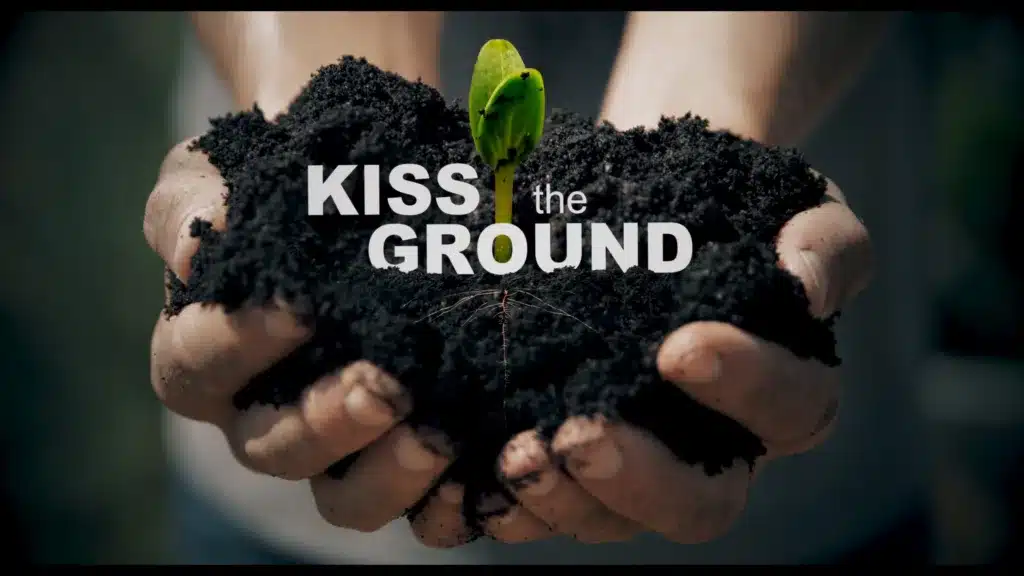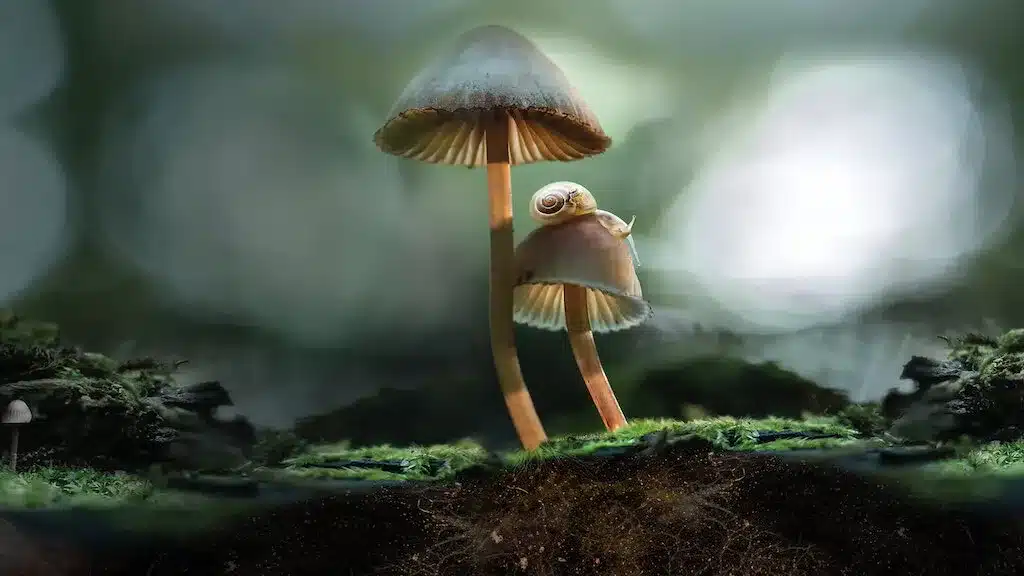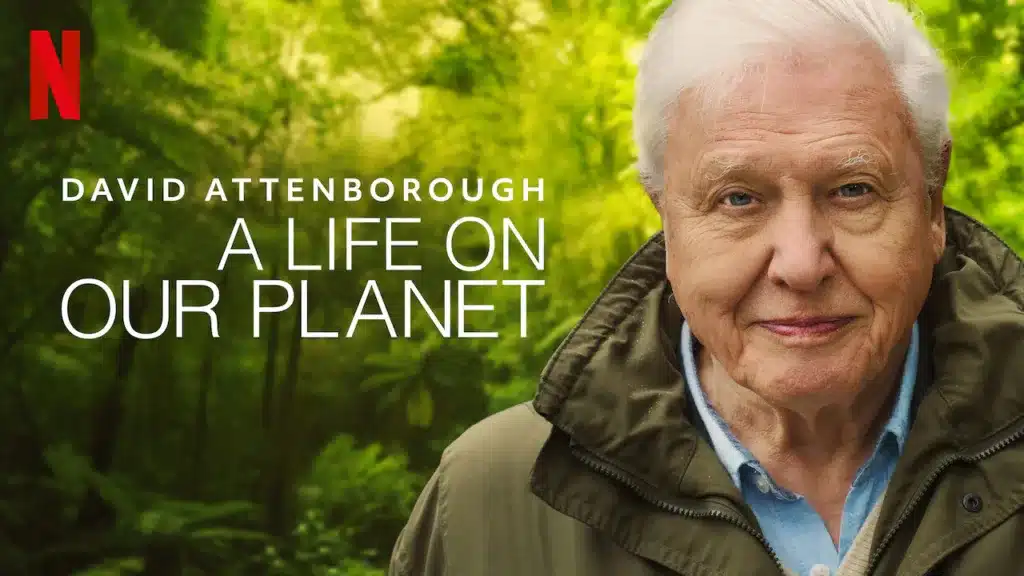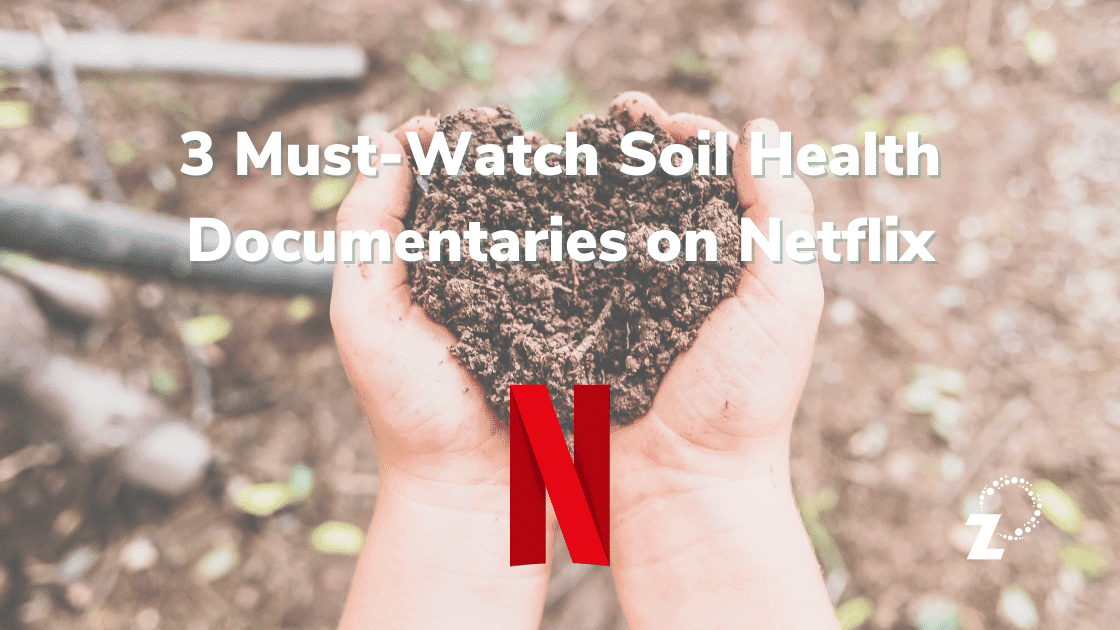These three awe-inspiring soil health documentaries on Netflix showcase the current state of our planet, but also provide us with the simple solutions we need to change our future.
- Kiss the Ground
- Fantastic Fungi
- David Attenborough: A Life on our Planet
- BONUS – more must-watch regenerative movies
1. Kiss the Ground

Produced in 2020, this full-length documentary speaks about the healing power of soil. It argues that the soil’s capacity to sequester carbon could be the key to reversing the effects of climate change. Narrated by Woody Harrelson, and in conjunction with numerous experts from around the world, it reveals how regenerative agriculture has the potential to balance our climate, replenish our vast water supplies, and feed the world. It is a simple solution, and is right under our feet.
Biosequestration is the storage and removal of carbon from the atmosphere by photosynthetic plants and bacteria. The soil environment can hold more carbon than the atmosphere and plants living on the surface of the soil combined. It is then so important that we ensure that every centimetre of ground has something growing on it, whether it be a farm, a park, or a garden.
Soil is alive, it contains a whole universe of life. Unfortunately many of our actions up until this point have become destructive to soil life. Our soil has become dirt. Massive erosion has been allowed to occur and we have been left with desertification.
Jeff Creque puts it this way: “The way we are feeding ourselves is undermining the very ecology that we are dependent upon.”.
Agriculture is the biggest way that humans can impact our landscape. And the primary tool of agriculture is the soil. We therefore need to move towards regenerative soil practices and restoration of biodiversity. Life can actually flourish under an agricultural system. We just need to farm like nature.
The very practices that heal our soil will also heal our climate. Save our soil and our soil might just save us.
Rotten Tomatoes Audience Score: 99%
Interestingly enough, Zylem and Kiss The Ground share a similar source of inspiration. In the early days, Zylem founder Justin Platt had a serendipitous meeting with Graeme Sait of Nutri-Tech Solutions (NTS) that cemented his resolve to develop a business around our concept of: ‘Soil Health, Plant Health for Human Health’. In 2005, Graeme Sait conducted his first series of soil health seminars in South Africa, hosted by Zylem.
In 2013, Kiss The Ground non-profit organisation co-founder, Ryland Engelhart, was invited to a conference in New Zealand to participate in a panel where experts explored whether humans could sustain life on Earth. It was here that Graeme Sait introduced Ryland to the concept of regenerative agriculture and the idea that if we could pull enough carbon out of the atmosphere and sequester it in soil, we could stabilise the climate.
After this life-changing encounter, Engelhart along with co-founders, Finian Makepeace and Lauren Tucker, gathered friends, neighbours and colleagues into Engelhart’s living room every week to figure out how to build public awareness and change the global narrative around soil as a solution to so many of humanity’s problems.
“They have done amazing work in spreading the word around the world,” Sait says.
Look down, look underneath your feet
Zylem Managing Director Justin Platt feels that the documentary’s cover image of the tree and roots says it all. “The world sees the above-ground tree, with little consideration that this is simply the result of the relationship between the below-ground roots and soil. Gabe Brown, Ray Archuleta and Alan Savory highlighted what it takes to feed the world, but not at the expense of the soil – regenerative agriculture!”
Justin refers to two “factories” of plant life, and thus life on Earth:
- The above-ground part of the tree houses (in the form of chlorophyll) the most efficient factory in the world – photosynthesis. Although 95% of the raw materials on which this “factory” is dependent are the freely available carbon dioxide from the atmosphere, water and sunlight, the crucial +/- 5% comprise minerals from the soil. The efficiency with which these minerals are made available to the plant is inextricably associated with a complex relationship between soil microbes and root hairs.
- The interface of root hair and soil is known as the rhizosphere, which is the second-most important (but lesser-known) factory.
Kiss The Ground highlights what is required to maximise the efficiency of the rhizosphere (the dynamic area governed by complex interactions between plants and the organisms that are in close association with the root), which they refer to as regenerative agriculture. This delicate rhizosphere interface is compromised by inorganic fertilisers and pesticides, which is DEGENERATIVE agriculture.
Another issue highlighted by the film is the importance of ensuring that every centimetre of ground has something growing in it (whether it be a farm, park or garden of any size). Anyone watching the movie will be horrified to see the clouds of dust and dirt disappearing into the atmosphere while the ploughs do their thing.
2. Fantastic Fungi

This 2019 documentary explores the numerous roles that fungi have within the natural world. It follows the work and passion of Paul Stamets, an American mycologist. There are over 1.5 million species within the fungus kingdom, 20,000 of which produce mushrooms. Stamets speaks of fungi as representing “rebirth, rejuvenation, and regeneration”. Through their decomposition properties, they generate soil that gives life, moving nutrients back into the cycle.
Fantastic Fungi also features multiple interviews, including with journalist Michael Pollan. He states: “If we didn’t have fungi we would get this build-up of plant matter that would choke the earth. They really are the key. They break down plant life and make it usable for new plant life, and for animal life.”
The film includes incredible time-lapse videos which capture a display of death and transformation, of new growth and new life. It highlights awe-inspiring mycelium which makes up most of the fungal organism. Mycelium is a web-like structure of long threads growing underground.
Carbon dioxide (CO2 ) is our biggest greenhouse gas. Through the process of photosynthesis, plants inhale CO2 and exhale oxygen. It has now been discovered that plants put up to 70% of carbon below the ground. Carbon is stored underground in the fungal cell walls, showing that fungi are really important in stabilizing carbon in the soils.
Stamets also touches on other possible environmental uses of fungi. These include the detoxification of oil, biopesticides, and the reduction of viral infections in bees.
This documentary opens up a whole new wonderful world of fungi and the amazing work it does right under our feet.
Rotten Tomatoes Audience Score: 94%
3. David Attenborough: A Life on our Planet

This 2020 David Attenborough documentary was made as a witness statement. It highlights the destruction of the natural world, the steep decline in the health of the planet, and a constant loss of biodiversity. All of these dramatic changes, which he exposes through vivid film sequences, have occurred in his lifetime. He presents figures that show how the wilderness has decreased and the atmospheric carbon has increased in his 93 years on earth.
One of the downfalls of this period has been the fast pace of progress. We have learnt to exploit the seasons with our farming methods and swiftly clear rainforests for our monoculture. We have replaced the wild with the tame. However, humans depend on the stability of the natural world to survive. He speaks of one fundamental truth. That we are “ultimately bound by, and reliant upon, the finite natural world about us.”
The human impact on the planet has been profound, and our needs have overrun the world. We are facing the collapse of the natural world and it is likely that a sixth mass extinction event is on the way. But he does not feel that all is lost. He feels that the answer is straightforward and we can change the outcome if we act now.
Attenborough feels that if we can manage our impact on the planet, if we can learn to work with nature, if we can rewild the world and restore biodiversity, we can begin to see an alternative future. We need to improve our farming practices and reverse the land grab, and rediscover how to be sustainable.
Ultimately, we need to see nature as our biggest ally and our greatest inspiration. A species can only thrive when everything around it thrives. So if we take care of nature, nature will take care of us.
Rotten Tomatoes Audience Score: 97%
More must-watch regenerative movies
These three documentaries are not available on Netflix but form part of a must-watch list of regenerative films. They are available to rent or buy online.
The Biggest Little Farm
Shot over eight years, this documentary follows John and Molly Chester’s goal of sustainable farming in a quest to regenerate the soil. It highlights both the hardships and successes of their journey towards perfect harmony with nature.
2040: Join the Regeneration
This documentary looks at what the world might look like in the future. It was motivated by the director’s concerns for the planet his young daughter will be inheriting. It looks to identify the best solutions currently available to us. It is a story of hope, a positive vision of what can be achieved.
To Which We Belong
Leaving behind conventional practices, this documentary follows both farmers and ranchers as they try to move towards more sustainable, and profitable, farming methods. In an attempt to save their livelihoods they are able to improve the health of the soil and sea, and even possibly save our planet.
As an extra, the BBC have an online series entitled Follow the Food. It includes three seasons of eight short episodes.
It’s not too late to start on your soil health journey
Get in touch with the Zylem team to find out more about our soil health solutions. Contact us on 033 347 2893 or send your enquiry to [email protected].

About the Author: Alex Platt
Alex is Business Development Manager at Zylem. He’s inspired by the potential of regenerative farming and takes a special interest in the technology and products that are moving agriculture in a more sustainable direction.

